PCOS Diet Plan : The Complete Guide (Grab the Free PDF!)
Last Updated on November 10, 2022 @
Read Time : 15 minutes
This guide covers all you need to know about making a great PCOS Diet Plan for yourself.
Here you’ll learn:
- The Causes of PCOS
- Need for a good PCOS Diet Plan
- The various diets for PCOS
- How to design your own PCOS Diet Plan and much more!
Let’s get started.

Contents
CHAPTER 1
PCOS: What is it and the Need of a Good Diet
1 out of 10 women of childbearing age suffers from PCOS. And dealing with it without any knowledge can make matters worse.
In this chapter, you’ll get to learn about PCOS, its causes, and why a good diet is the only real way to fight it.
Let’s go!
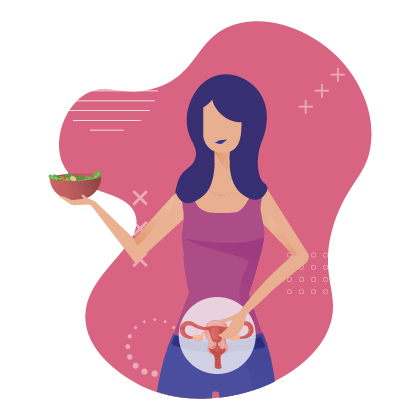
Polycystic Ovarian Syndrome or PCOS is a condition that occurs during a woman’s childbearing years that causes hormonal imbalances in women which lead to several health problems.
A few of these include diabetes, cardiovascular problems, severe mood swings, and even endometrial cancer.
The hormonal imbalances may lead to disruption or even the stoppage of periods, excessive body hair growth, and acne.
PCOS has now become increasingly common among young women in recent times which makes it so much more concerning.
How a Good Diet Can Help with PCOS
One of the major reasons for PCOS is the lack of a healthy diet. And a lot of studies have proven that simply fixing your diet helps in treating PCOS.
This is because an unhealthy diet can cause an increase in insulin resistance which then leads to an imbalance in hormones.
Insulin is vital for the breakdown of sugars in your food to produce energy. When your body is unable to use insulin to break down sugars efficiently, your blood sugar levels rise. The body then produces more insulin to break the sugars which causes hyperinsulinemia. In response to the high insulin levels, the ovaries produce more androgens or male hormones like testosterone.
An excess of male hormones leads to the hormone imbalance which results in PCOS. Excess male hormones in a female body is what causes all the problems, from missed or delayed periods to acne, weight gain, and excessive body hair.
All this with rising blood sugar levels and the inability of the body to break down the sugars leads to an exponential growth in weight.
Therefore, a diet that helps to reduce the body’s insulin resistance is what you’re looking for in a PCOS diet plan to lose weight.
So let’s look at how you can bring down insulin levels and avoid all the chaos in your body with a list of the foods to eat and foods to avoid with PCOS.
CHAPTER 2
The Best and Worst Foods for PCOS
Now that you understand why a good diet is so important, let’s dive deeper into finding what makes up a good diet for PCOS.
In this chapter, you’ll find a detailed PCOS food list of the best and the worst foods for PCOS.
By the end of this chapter, you'll have a clear idea of how you can start building up your diet with our free PCOS diet plan template.
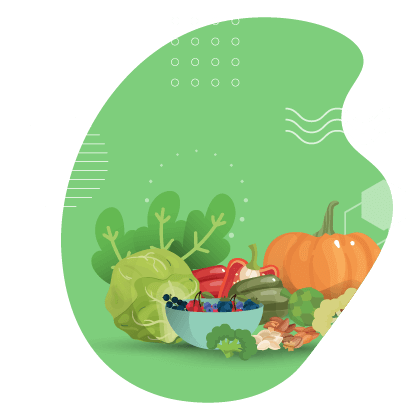
Let’s start simple.
The golden rule to have a good diet for PCOS is to avoid the intake of any simple sugars as they cause spikes in your blood sugar levels.
Stay away from anything that comes out of a packet. As convenient ready-to-cook meals or a packet of chips may be; they carry shocking amounts of simple and complex sugars, sodium, unhealthy fats, and preservatives.
That said, here is a list of foods that you should and should not eat when you are following a PCOS diet to lose weight:
Foods you Should Eat for PCOS
High Fiber Foods
High Fiber Foods help by slowing down digestion which results in a lesser impact of sugar on your blood. Below is a list of food you should include in your diet:
- Cruciferous vegetables - Broccoli, Brussels Sprouts, Kale, Spinach, Cauliflower, and Cabbage
- Green and Red Pepper
- Beans and Lentils
- Nuts - Pistachios, Almonds, Walnuts, and Pine Nuts
- Chia Seeds
- Berries - Blueberries, Cranberries, Blackberries, and Cherries
- Winter Squash
- Pumpkin
- Artichokes
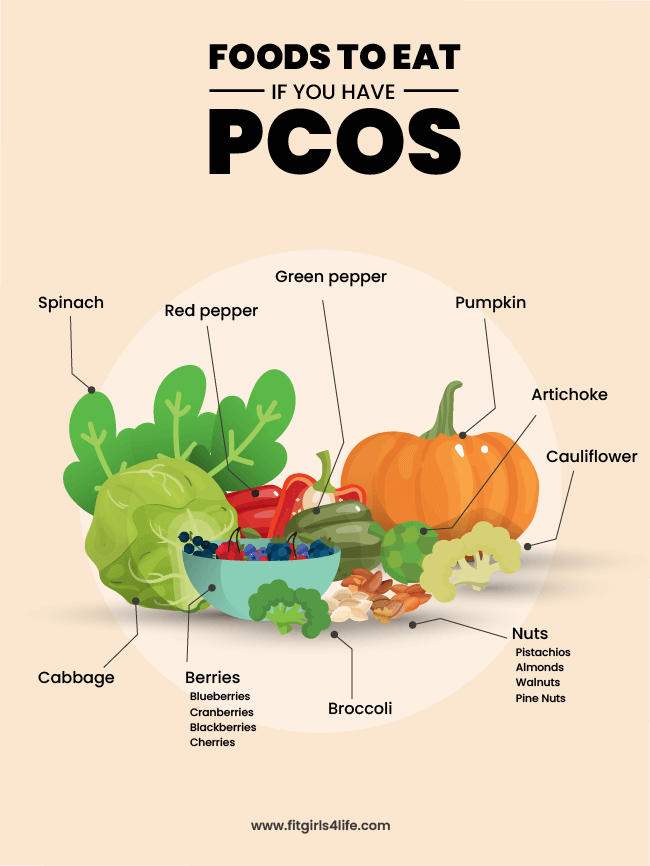
Lean Proteins
Lean Proteins are another essential element of a healthy diet. Try to incorporate them by eating tofu, chicken, and fatty fish like salmon, tuna, sardines, and mackerel.
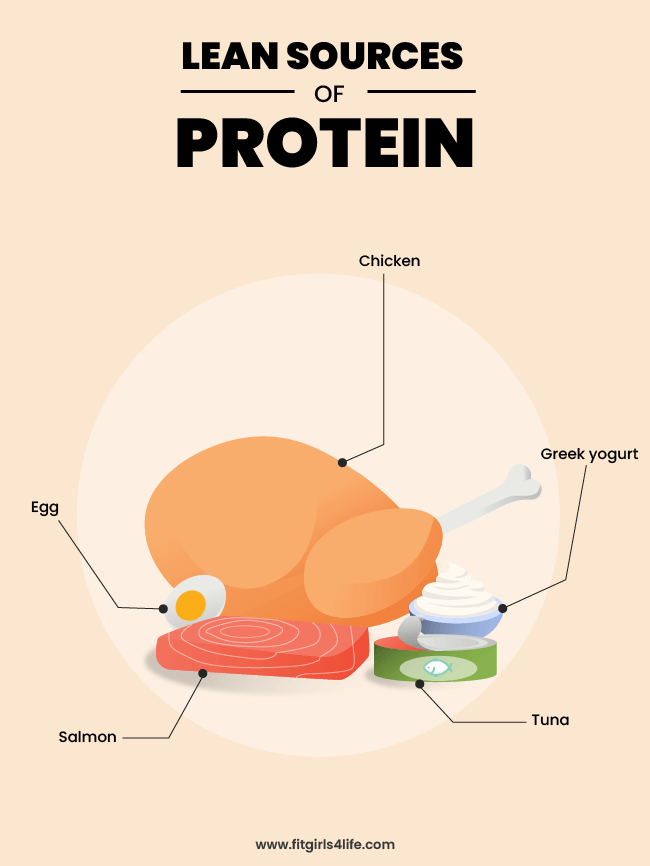
As you personalize meals to your own eating habits, you may not be able to include everything in your diet. That’s completely fine as long as you have control of your calorie intake. Apart from these, you can find several other options in the List of foods for PCOS: 8 Best food items for Everyday PCOS meals!
Food You Should Avoid for PCOS
Refined Carbs
Refined Carbs are easy to break down into sugars and can quickly spike up your blood sugar levels. As it’s refined, it lacks any healthy fiber, is very high in calories, and aids in inflammation.
Dairy Products
Avoid dairy Products for PCOS as it's a cause for Obesity and an increase in testosterone. It's because cow’s milk has something called IGF - 1 ( Insulin Growth Factor 1) that enters your body and acts just like insulin. Since your body’s insulin resistance during PCOS is high, it will release androgens to counter hyperinsulinemia.
This will in turn lead to an imbalance in hormones. So, avoiding dairy products is a must. You can switch to vegan milk like almond, soy, or coconut milk.
A study has also shown that low-dairy diets can help in increasing insulin sensitivity and reducing testosterone in women with PCOS. This gives enough clarity on the harmful effects of dairy products on women with PCOS.
Bad Fats
Bad Fats like trans fats, hydrogenated and semi-hydrogenated fats can result in an increased risk of heart problems and Type-2 diabetes. Try to avoid refined oils and vegetable oils. You can switch to coconut oil which is the best alternative that can help reduce insulin resistance and even increase metabolism.
Sugary Drinks
Sugary drinks are also bad options as they cause spikes in blood sugar. In drinks, avoid sodas, bottled fruit juices, and smoothies. These contain a lot of sugar and will cause problems if you’re struggling with high insulin resistance. Instead, opt for fruits as they have a lot of fiber in comparison to the sugar they carry.
As for foods, avoid cakes, candy, toffees, cereal, sugar yogurt, and dairy ice cream as they carry a ton of sugar.
Alcohol
Studies suggest that women with PCOS have higher rates of fatty liver. Adding stress to it with alcohol can only be detrimental. By fixing your diet, you will be able to manage your liver. And as your body feels healthier, you can occasionally go for a glass of wine. But it’s strongly recommended that you do not consume alcohol during your initial stages of dieting.
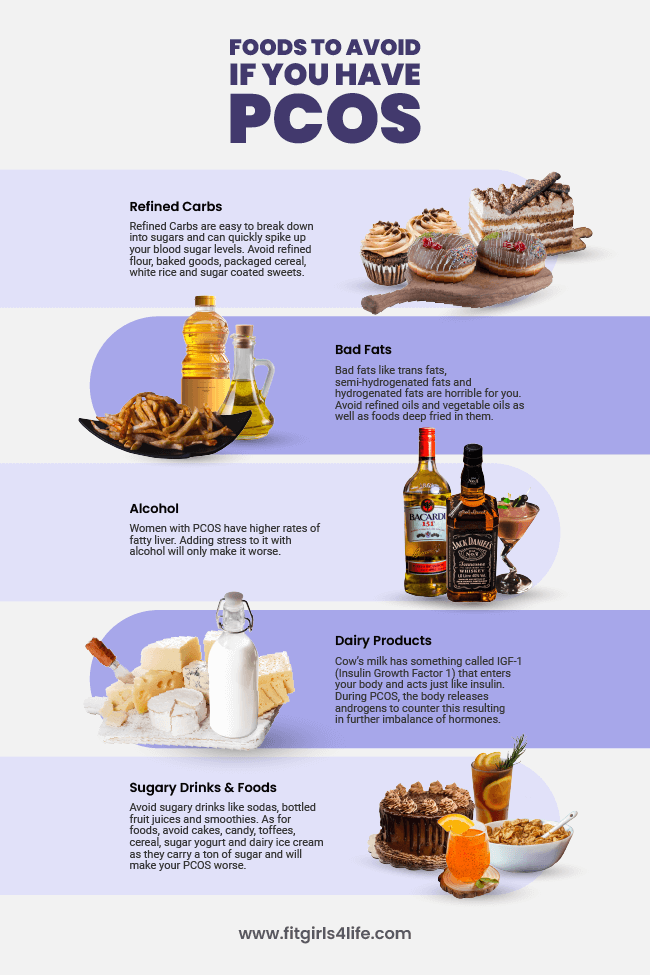
CHAPTER 3
How to Lose Weight with PCOS
For a lot of women with PCOS, a very unfortunate side effect is excess weight gain that happens way too fast and seems almost impossible to get rid of.
In this chapter, you'll learn about common problems women face while trying to lose weight with PCOS and how you can avoid them altogether.
You’ll also learn what makes up a proper plan to follow to lose weight and get to your desired number!

In Chapter 1, you learned about PCOS in detail and understood what makes it so troublesome. Dropping insulin sensitivity levels, and hormones going haywire can make losing weight seem nearly impossible.
On top of that, all 4 types of PCOS contribute to your weight gain based on their respective side effects. It's important to know the specific cause behind your weight gain, to combat it effectively.
Making weight loss a priority can really help in getting rid of PCOS and bringing your hormone levels back to optimal levels. And to lose weight, you must focus both on a proper diet and good exercise.
Maintain a Calorie Deficit
When it comes to your PCOS diet plan, there’s one thing to always keep in mind - you must be in a calorie deficit.
A calorie deficit means that your daily calorie intake through food and fluids should always be lesser than what you burn. You burn calories by doing normal daily activities and burn more when you indulge in exercises.
Counting calories may seem a troubling task, but it really isn’t. You could familiarize yourself with the calories from certain foods and create a routine plan for your daily calorie intake. Another way to go about eating is simply moderating your food intake. Pre-planning your meals and eating nutrient dense, high satiety foods can really help you avoid overeating. Moreover, as we discussed in the last chapter, you want to reduce your carb intake and increase your intake of protein and good fats.
High Intensity Exercises for the Win!
As for exercise, a combination of weight training and high-intensity interval training which is proven not only to burn more calories in the long run but also improve insulin sensitivity which has a direct impact on helping you recover from PCOS.
A rigorous exercise routine would not only burn calories and excess fat but also increase metabolism and make you feel fresh and energized throughout the day. Pairing that up with a good protein intake will ensure you have stable energy levels and feel less hungry.
While it’s great to experiment and try out new diets, the number of different diets out there might seem overwhelming to many. Plus, finding the right exercise routines to follow can just add to the stress you’d feel due to PCOS. That’s why we’ve covered both of these topics in greater detail in the coming chapters. You’ll find the best diet plans to follow for PCOS along with lifestyle changes to help with weight loss.
There are several ways in which you can lose weight with PCOS. The only key is to pick the right approach and follow it diligently.
CHAPTER 4
Diet Plans For PCOS
In this chapter, you’ll learn about the most popular diets for PCOS.
These diets will give you an overall framework to follow when selecting what kind of meals to eat.
Each of these aim to make the same major changes but the few differences in each are mentioned to help you decide which one suits you and your lifestyle the best.
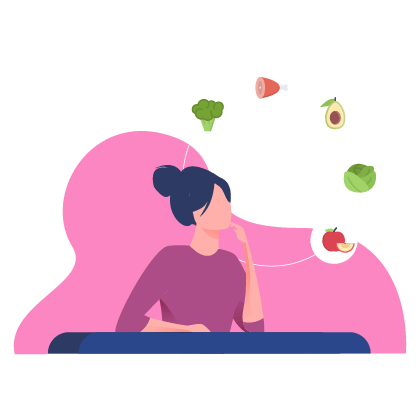
The Ketogenic Diet a.k.a “Keto”
The Keto Diet is a popular method of losing weight and is the first suggested diet for a search on “how to lose weight with PCOS”. It’s a highly effective diet where you restrict your carb intake to no more than 20-30 grams in a day. The rest of your daily calories come from fats (75% calories/day) and protein (20% calories/day). Since the allowance for carbs is practically almost nothing; the only options for carb intake are fibrous vegetables.

The Keto Diet has shown great results for women with PCOS. A study conducted on a group of obese women with PCOS who restricted their carb intake to just 20 grams/day showed significant weight loss results in just 6 months. For this reason, Keto Diet is a great PCOS diet plan for weight loss.
A Keto Diet for PCOS can be extremely effective and help you lose weight as long as you eat the right foods. But if eliminating carbs like in Keto is too extreme for you, the next best option is Low-Carb High-Fat (LCHF). However, it’s best to understand the difference between the Keto diet and a low carb diet before making your choice!
Low Carb High Fat Diet
The Low Carb-High Fat (LCHF) diet, as the name suggests, focuses on limiting your carb intake and increasing your fat intake. This can be yet another effective PCOS diet plan to lose weight.
According to Healthline, the ideal carbohydrate intake on an LCHF diet should be somewhere between 20-100 grams in a day. A reduction in carb intake restricts bad eating habits and helps stabilize blood sugar levels, which then results in weight loss.
Aren’t Fats Bad for My Body?
Like all things, a balance will ALWAYS benefit you. There’s a difference between stored fat and dietary fat. Excess calories from your meals are stored by the body as fat to use in the future if there is no food to eat. Dietary Fat, on the other hand, is one of the three main macronutrients in food and is essential for several bodily functions. They’re not the same.
Thus, consuming the right fats in the right amount is GOOD for you.
Unsaturated Fats
Unsaturated Fats are what most of your daily fat intake should consist of. They come from sources like almonds, walnuts, hazelnuts, fatty fish like tuna and salmon, plant oils, avocados, and olives. As LCHF demands an increase in fat intake, these are the foods that you should target as they pack several vitamins and minerals as well.
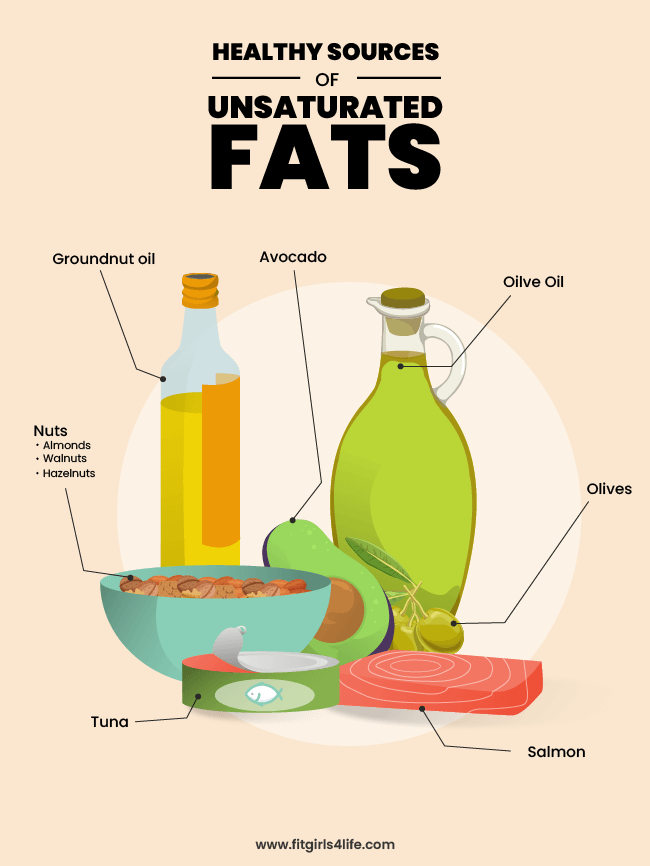
Saturated Fats
Saturated fats, contrary to popular belief, aren’t actually bad for you. Sources like ghee, butter, cheese, coconut oil, cashews, brazil nuts, macadamia nuts and eggs are all good quality saturated fats and should be included in your PCOS diet plan - in moderation.
Check out Saturated fats vs Unsaturated fats and how to know the right kind to learn more.
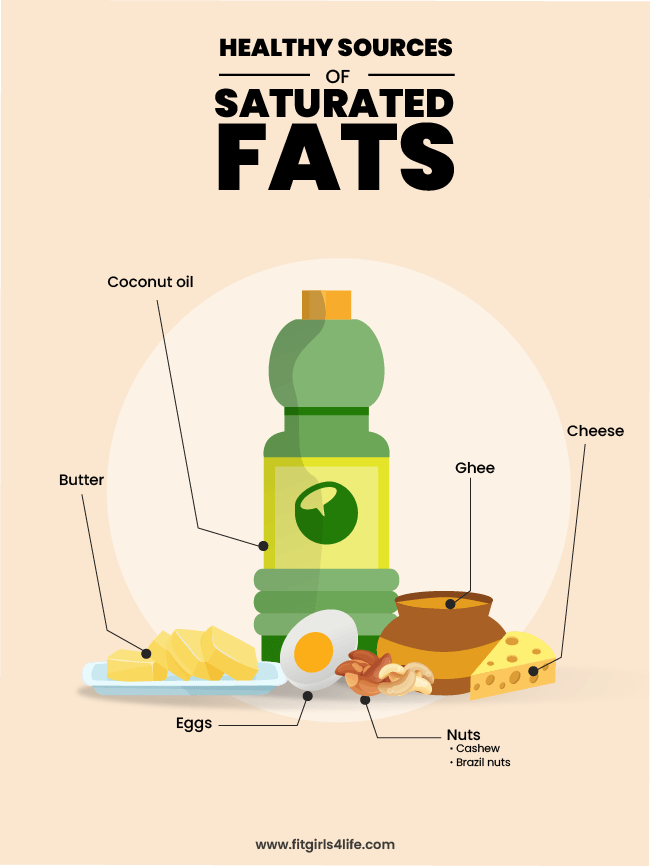
Unhealthy Fats Vs Healthy Fats
The main difference between unhealthy fats and healthy fats is that while unhealthy fats increase the levels of bad cholesterol levels (LDL), healthy fats improve good cholesterol (HDL) in your body.
Healthy fats include monounsaturated and polyunsaturated fats, whereas trans fat is unhealthy. Unhealthy fats also increase your chances of contracting cardiovascular issues and raise the possibility of strokes.
On a PCOS diet plan, make sure that you eliminate the consumption of unhealthy fats. But at the same time, including a moderate amount of healthy fats can do a great deal. They help fulfill the calories count on a low carb diet while providing essential nutrients to your body.
Unsaturated fats also help reduce inflammation in your body which is a common side effect of PCOS.
Nuts, seeds, avocado, salmon and olive oil are some of the best fats to include in your PCOS diet plan. On the other hand, vegetable oils, fried food, margarine and desserts made out of dairy contain bad fats for your body.Good quality fats not only provide you a source of energy but are also essential for many vital functions in the body including proper hormone balance.
To fight PCOS, try to restrict your carb sources to brown rice, fruits, whole grains and vegetables. Avoid starchy foods like bread, pasta, potatoes and white rice. You must also avoid any processed or junk foods.
With the limited allowance of carbs you get on a PCOS diet plan, it’s important that you fill it up with healthy, clean and nutritious options.
Paleo Diet
Paleo Diet, also known as a Caveman diet, tries to inculcate a habit of eating natural foods and restrict any form of refined, processed foods.
In this diet, you mainly focus on organic food or anything that is natural, from organic meats and eggs to nuts, avocado to green leafy vegetables and oils.
The Paleo diet is known to boost your metabolism and reduce inflammation because of its food limitation to natural products. You must avoid any cereals or grains in a Paleo Diet as well which helps greatly with insulin resistance.
The ability to reduce insulin resistance and optimise hormone levels so well makes Paleo Diet one of the best diet methods for women suffering from PCOS.
Avoid processed or unnatural foods, cereal and dairy to get yourself a diet that will help you immensely with PCOS and even with weight loss.
Low-Glycemic Index Diet
Low-Glycemic Index Diet is not designed specifically for PCOS but helps in managing insulin resistance and blood sugar levels spike which is key for fighting PCOS.
Low GI foods release sugar slowly into the bloodstream, which prevents blood sugar spikes and ultimately avoids any complications. This is because Low GI foods like vegetables and some fruits are rich in healthy fiber and thus take more time to digest.
A study showed that menstrual cycles returned to normal in 95% of women in the test group who were on a low GI diet in comparison to 63% of women, who were on a standard weight loss diet.
Another benefit of this method is how effective it is in controlling your calorie intake. The foods allowed in this method are not calorie rich and thus help prevent overshooting your targeted calorie intake in a day.
Anti-Inflammatory Diet
This is the least restrictive diet out of all and focuses on the basic idea of a ‘Healthy Diet’. You try to nourish your body with green leafy vegetables and other healthy vegetables, plant based organic protein. And you remove processed sugar, gluten, dairy, soy, nuts and caffeine.
Studies have shown that anti-inflammatory diets have helped in regulating blood pressure, menstrual cyclicity and insulin levels while even resulting in a 7% loss of body fat. Moreover, it helped 12% of women suffering from PCOS to conceive.
This is why Anti-Inflammatory Diets are often suggested to women who wish to conceive as a PCOS diet plan to get pregnant. To learn more, check out How to get Pregnant with PCOS: The Quick & Natural Guide to PCOS Pregnancy!
PCOS Diet Plan for Vegetarians
If you’re a vegetarian, you can follow any of the above mentioned diets as they include a ton of vegetarian foods in their diet composition. Plus, there are always alternatives for that which you can’t eat.
While following a Vegetarian Keto Diet for PCOS, you can switch meat and eggs with other protein sources such as cottage cheese, tofu, whey protein, plant-based protein powders etc. Instead of fatty fish, you could opt for avocados, nuts and nut butter to get those good fats. And include more green leafy vegetables that are relatively high in protein and fiber but lower in carbs.
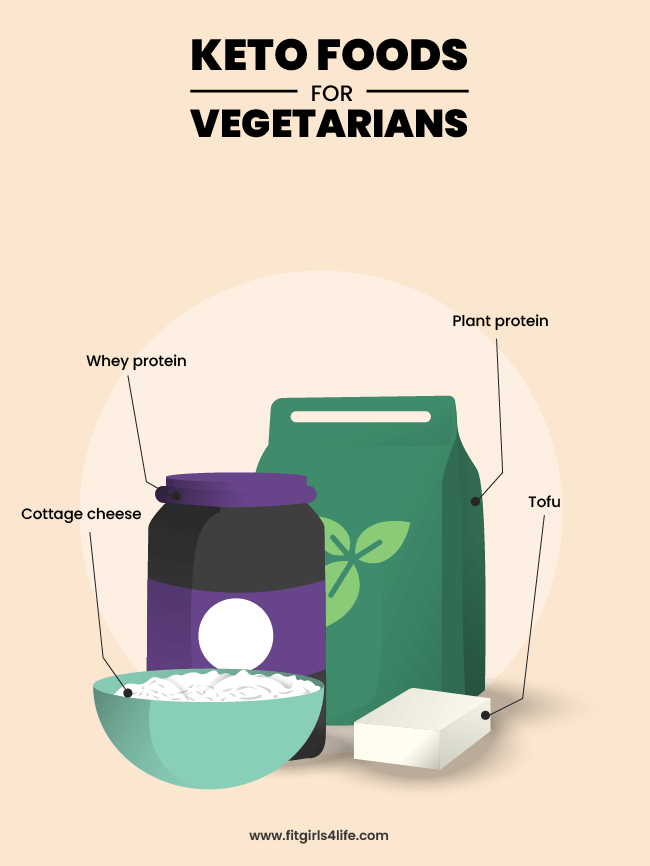
If you opt for something like LCHF, you get a wider variety of legumes like soybeans, lentils and chickpeas. These have more carbs but they fit well in an LCHF diet if used in small quantities.
Paleo and Low GI diets follow a similar fashion of alternatives. For a Low GI diet, you can include vegetables like carrots, spinach, cucumbers, tomatoes and cauliflower. As for fruits, you can eat berries, oranges, apples and grapes. For Paleo, all you need to do is ensure that your produce is organic and chemical-free.
Finally, Anti-Inflammatory Diets allow for an even bigger variety of foods. Eat high fiber fruits and vegetables and include anti-inflammatory vegetables like tomatoes, kale and spinach that help burn fat and increase insulin sensitivity.
Choosing the Best PCOS Diet Plan for you
It’s an overwhelming decision to choose and follow a diet plan religiously. But starting out slow is always an option.
Try incorporating a few things into your daily meals. Shift from refined oils to coconut oil, consume more food rich in fiber and start throwing away any processed food in your kitchen cabinets.
Cook meals at home. This makes it that much to track calories and the food that you’re eating. In order to maintain your health, taking time out in the day to cook healthy meals is definitely worth it. You can find several good PCOS diet recipes online.
Choose one of the diet plans mentioned above that you may be able to follow well in your day. The main goal is to stick to a good diet and small changes can go a long way.

CHAPTER 5
Sample PCOS Diet Plan for Weight Loss
In this section, we'll share with you a simple and easy to implement sample PCOS diet plan for weight loss.
You'll also get a neat little calculator which you can use to find out exactly how many calories and macronutrients you need to consume for your ideal PCOS diet plan.
Let's get to it!
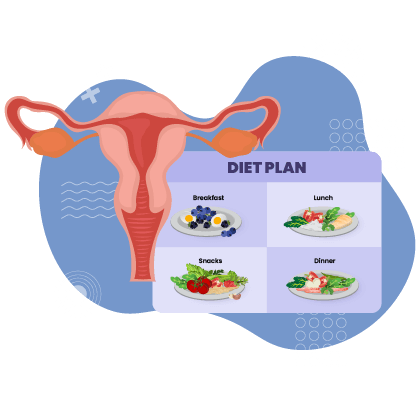
For many people with PCOS, having a visual representation of the best diet to follow makes things a lot easier. If you're one of them, following a PCOS diet chart will be best for you.
A good diet chart includes the calorie intake you need to maintain along with a variety of foods you can eat for breakfast, lunch, and dinner. Based on all that this article has discussed, we've made our own sample 1200 calorie PCOS diet chart that you can refer to as an example of what a good healthy daily PCOS diet should look like. Here it is :

Now the above is, of course, just a sample meal plan. It needs to be modified to YOUR caloric requirements in order for it to be most effective for you.
Luckily, we have just the thing for you with our very own custom FREE PCOS Calculator form which will calculate the exact calories and macronutrients you need to consume on your PCOS Diet Plan. Go ahead and give it a whirl!
But wait... there's more!
We've also got a FREE 7 Day PCOS Meal Plan PDF we've prepared for you including a whole bunch of delicious PCOS friendly recipes. Grab it here:
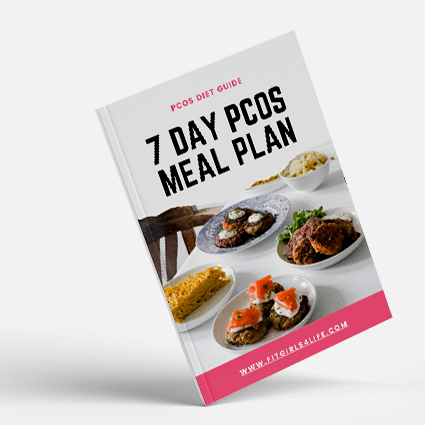
Download your FREE
7 Day PCOS Meal Plan
Now that you know what an ideal PCOS meal plan looks like, you can simply curate your very own customized plan using the ultimate guide on PCOS Meal Planning: 7 Easy Steps to Make Your Own PCOS Meal Plan!
CHAPTER 6
Other Lifestyle Changes for PCOS
There’s a lot more you can do for PCOS other than just alter your diet.
In this chapter, you will learn about a few changes that you can make in your lifestyle to avoid any chances of the recurrence of PCOS.

Don’t Skip Breakfast
One of the biggest mistakes people make to lose weight is skip meals. Rather than skipping meals, following a balanced diet and regulating your food intake is a better option.
A study conducted on lean women suffering from PCOS showed that a heavy breakfast and a light dinner resulted in a reduction of testosterone levels in women and increased chances of ovulation 30% more than women who had a small breakfast.
Avoid Undereating
Missing meals can be harmful for women suffering from PCOS. A study conducted on lean women showed that those who skipped breakfast had lower levels of energy during the day. But more importantly, it also increased their risk of insulin resistance. In a case such as PCOS, this would only further aggravate your condition and so any situations that would increase your insulin resistance must be avoided.
Eating properly and on time should be a priority for those suffering from PCOS. We’ve already established how good diets such as the LCHF diet can help improve insulin sensitivity and reduce hyperandrogenism. Skipping meals to reduce weight therefore shouldn’t be the approach. Rather eating healthy and on time should be your daily goal. Snacking is an important part of any diet plan. Make sure to include PCOS Snacks in between your meals to keep yourself full and avoid cravings.
Exercise Regularly
Combining physical activity with a balanced PCOS diet can have several benefits like:
- Weight Loss
- Improved Metabolism
- Regular Periods
- Lower Cholesterol Levels
Cardio
Cardio is a great option to start exercising. It will build up your stamina levels and contribute to improving your metabolic levels. Plus, cardio helps in reducing insulin resistance, boosting fertility, and improving mood. You can start with cardio exercises like jogging, cycling, and running. Keep it challenging by increasing the intensity and duration of these exercises. However, give yourself breaks in between to avoid any injuries.
You can also include some HIIT exercises that are much more challenging than steady-state cardio and improve insulin sensitivity and metabolic levels drastically.

Resistance Training
Resistance Training is yet another important exercising routine you should follow. Research shows that resistance training improves hyperandrogenism (an excess release of male hormones) thereby improving reproductive health, helps burn visceral fat, and reduces fasting glucose levels.
Combining weight training with aerobic activities further boosts metabolic levels and reduces insulin resistivity. You can form segments in your workout routine, giving sufficient time to both resistance training and steady-state cardio. However, maintaining a good diet is necessary to provide enough nutrition for your body to recover.
Moreover, through weight training, you build muscle, which is where your body’s metabolic processes occur. Thus, building muscle will improve your insulin sensitivity and help maintain optimal blood sugar levels.

Yoga and Meditation
To keep mental clarity and stay refreshed, find time to meditate for 10-15 minutes every day. You can do this as soon as you get up in the morning to stay energized throughout the day.
Moreover, start your day by doing Yoga. A 20-minute session will help in stretching your muscles that may have gotten stiff overnight. You can follow your yoga with meditation to feel more relaxed

Get More Sleep
Your sleep patterns can also affect your metabolic levels and further affect your condition. Try to get around 6-8 hours of sleep to ensure your body gets time to recover. This will also help in avoiding any drop in metabolic levels and insulin sensitivity.
Moreover, lack of sleep prompts you to overeat, due to an increase in hormones like cortisol and ghrelin. This, in turn, further increases the risk of PCOS.

Setting Reasonable Goals
Be patient and rational with your goals. You won’t notice results overnight. Monitor your weekly progress and alter your habits to do a little better every week. This way you’re constantly making progress without over-burdening yourself with goals. Moreover, find ways to form diet plans that also consider your age as well. If you’re a teenager, then look for a PCOS diet plan for teenagers.
Follow our good food/bad list and try to stick to it as much as possible. Create a well-researched PCOS diet and exercise plan for yourself. Make weekly inclusions and research online to find any new alternatives that may show better results. Learning more never hurts. Look for good PCOS diet books that can help you get a greater insight on different diets to follow for better results.
Take the right Supplements
Taking supplements is certainly not bad for your body. Instead, having them in proper doses can help your body find a balance to further function properly. When it comes to PCOS, you can take supplements that help with blood sugar control. And one of the best supplements known for it is Myo-inositol.
Myo-inositol
Myo-inositol is usually prescribed to women with PCOS and even those struggling with acne.
It comes from inositol, which are 9 naturally occurring compounds that are similar in structure to B-complex compounds and are found in citrus fruits.
Myo-inositol works great to improve-insulin sensitivity helps improve menstrual cycles and further improves fertility. Since it improves insulin sensitivity, your body can control the secretion of insulin and androgens much better. This reduces other symptoms of PCOS, such as body hair and breakouts. To learn more, check out: PCOS Facial Hair: Know the Causes and 3 Best Fixes to try NOW!
While it has many benefits, one often misleading one is its effect on weight loss. It does help with insulin sensitivity but does not burn fat. You need to do that by exercising and eating healthier.
You can consult your doctor and find the right dose for you. Myo-inositol is surely something you want to learn more about.
Other supplements include:
Curcumin
Naturally present in turmeric that’s a great anti-inflammatory supplement and even helps with improving fasting blood glucose levels.
Fish Oil
If you’re someone who’s on a Keto diet but does not like eating fish, you should consider fish oil. It provides your body with essential omega-3 fatty acids and helps you reach your daily fat intake goal.
Probiotics
Your gut’s bacteria are responsible for a lot of different processes. Probiotics can help in providing your body with those essential bacteria and bring them back in proper amounts for a healthy gut. While there aren’t any that we can directly recommend, you could see your doctor and find out a way to test yourself to find out what probiotics you should be taking.
We must stress consulting a doctor before taking any supplements. Your body may react differently to an improper dosage and you can avoid that by taking professional advice.
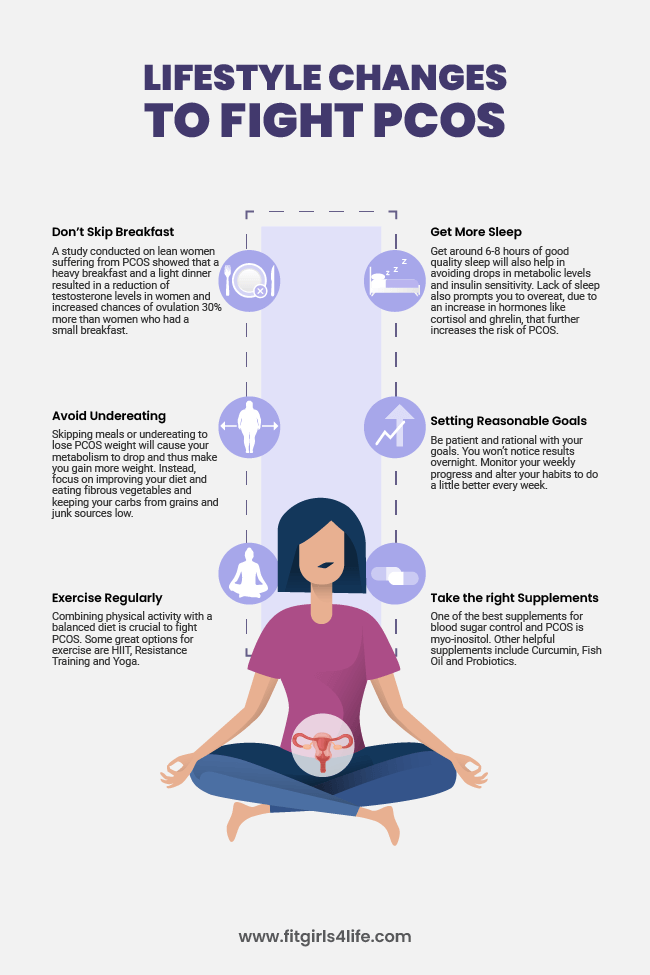
Now it’s Your Turn
There you have it. Our Comprehensive Guide on a PCOS Diet Plan
Are you excited to finally get rid of PCOS? Which specific tips are you going to apply first?
Which diet plan are you going to go for? Will you choose the Keto Diet? Or maybe the LCHF diet?
Let us know by leaving a quick comment down below!



Perfect guide.. covered everything that i was looking for.
Thank you
Glad you found it helpful 🙂
Sangat membantu saya menambah pemahaman tentang pcos dan berbagai penjelasan diet yg harus saya lewati. Terimakasih banyak
Luar biasa! Senang Anda merasa terbantu! 🙂
PS: Saya menggunakan Google Translate jadi mohon maaf jika ada kesalahan 😅 (I’m using Google Translate so please bear with any mistakes)
Meal plan
Hey Mairabella,
Could you be a bit more specific on what you mean or need?
I love food how can I avoid it!?, is there any diet that limited the bad food for me?
You don’t need to avoid food. A well designed diet can be just as delicious as the “cheat” food available as long as its planned well and makes smarter substitutions for the right kind of nutrients.
I’d suggest you download our Free 7 day PCOS diet plan shared above in this article. That’s a great starting point for you to see how eating healthy DOES NOT have to be tough or hard on your taste buds. Also, very soon we’ll be sharing something even bigger and better. So just keep an eye out for our emails and you’ll be all set. Promise! 😀
Thank you for sharing this very helpful information! I would also like to know which of the identified nutrition plans, has been found most effective for weight loss and Type II Diabetes. I’ve found my glucose levels occasionally drop midway of my workout; cycling at fast pace, lap swimming just over a mile, weight/resistance training.
Thank you!
I’d say a lot of folks have found great results with the Keto Diet. It’s great for weight loss and especially controlling type 2 diabetes. However, any of the mentioned diet plans can work as long as you’re in a caloric deficit (eating fewer calories than you’re burning). It comes down to a balance of effectiveness vs personal preference.
I am going to do the KETO diet
Sweet! Don’t forget to check out our guide on the Keto Diet for Women to learn all about it 🙂
Can we have vegetarian diet plan
Yes! We’re working on a follow up article on a PCOS Diet for Vegetarians/Vegans. Stay tuned 🙂
Idk, maybe a Keto Diet
Awesome! Check out our guide on the Keto Diet for Women to learn everything you need to know about it 🙂
Thx for this article. It helped a lot.
Glad you found it helpful, Bella 🙂
Thank you for this. Having PCOS is an issue in itself that can seem so deflating. It’s also hard because we’re given so many possible options or ideas that could work but putting a plan together yourself can be taxing. This is really helpful and I appreciate it.
Hey Jane, I’m SO glad you found this helpful. PCOS is a hard battle indeed. But as a sisterhood, we can fight and beat it TOGETHER!
Please do have a look at the other PCOS content we’ve put up (and we’ve got a lot more in store) and if you need any further help or just an ear to vent to; join our free innercircle email group and shoot me a response to the first email you get. You’re not alone in this! 😀
How do I download pdf
Just put in your email in the box provided at the end of Chapter 5 of this page and you’ll get it sent directly to your inbox 🙂
how do i print all the chapters? When I click save as pdf all i got was the meal plan and when i click on print the page all it prints out is the calculators.
Hey Kaitlin,
Just Right click > “Save page as” to save the entire page into a file. Then you can open and print the file on any printer 🙂
Thank you for all this amazing advice! I’ve been dealing with PCOS since I was twelve. Its definitely time for a change permanently in my life.
Glad you found it helpful, Yary. And I’m so happy to hear your confidence and enthusiasm to make the change! We’ll be right here for you if you need our help in any step of the way <3
This is absolutely AMAZING!!!! One of the best websites I have found In a while.
Thank you so much Brittani! Means a lot to us <3
How do we get this PDF?
Hey Cianah,
Just put your email in at the download box at the end of Chapter 5 of the article and you’ll receive the PDF straight into your inbox!
Or just send us an email at innercircle@fitgirls4life.com and we’ll do it for you 🙂
Great Website !! Correct and complete information .Thank you !
Thank you so much Vidya ❤️❤️
I’ve recently been diagnosed with bilateral PCOS and OMG! I don’t have to mention how overwhelming it is for new cysters to find proper information regarding how to deal with it. I stumbled upon this article while I was surfing google images and haven’t left this page at all. Thanks for all the great and detailed content! It has definitely helped me properly streamline the process I should follow in order to treat my PCOS. Much love! <3
Sending much more love right back at you <3
The fact that you wrote “One of the major reasons for PCOS is the lack of a healthy diet” and “Polycystic Ovarian Syndrome or PCOS is a condition that occurs during a woman’s childbearing years” show you have absolutely no understanding of PCOS, or the expertise for writing articles about it. You should really consider getting a medical reviewer because your information is incorrect and could cause harm.
Could you please elaborate on why either of those two statements is wrong?
thank you very much. Hope this will reduce my PCOS SYMPTOMS
So informative. Thank you for helping me understanding my condition and helping me get on the right path.
Happy to be of help, Teresa <3
This diagnosis and everything that comes with it is very overwhelming. Thank you for consolidating information and offering free materials to help us get started on our healing journey!!
❤️❤️
Really knowledgeable but just one doubt which is I read a lot of articles saying keto diet is not good for women with PCOS. Can you confirm if that’s right or no
Not true at all. There are tons of women with PCOS that swear by Keto being the reason for their success against it.
That said, whether the keto diet is right for YOU, is something you should be consulting a professional for.